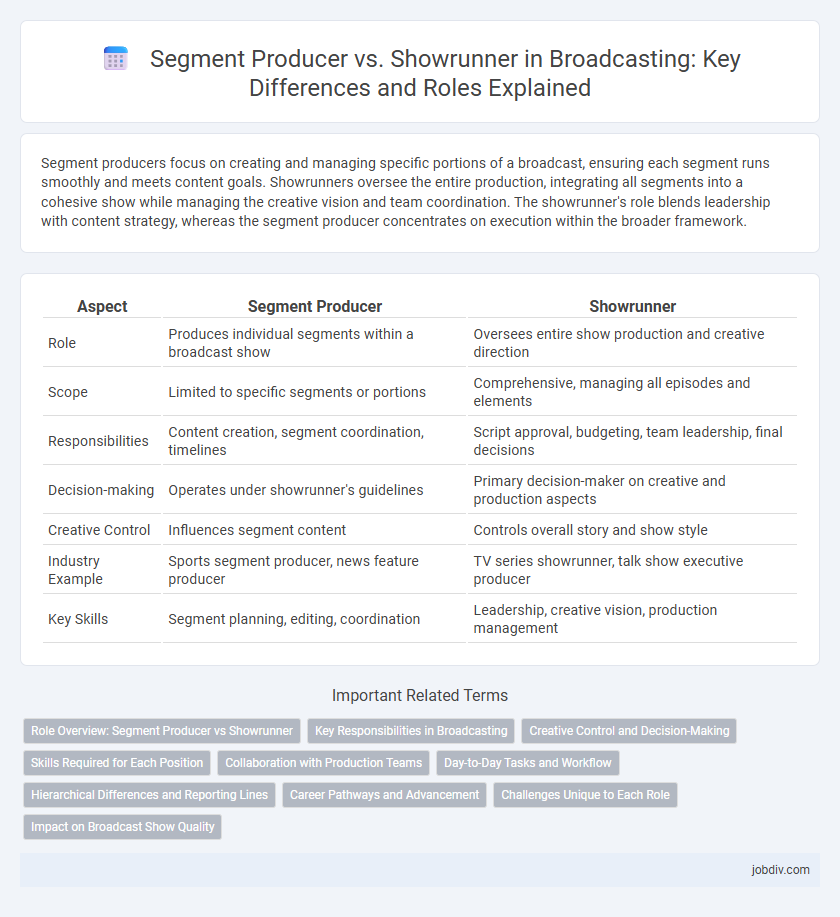Segment producers focus on creating and managing specific portions of a broadcast, ensuring each segment runs smoothly and meets content goals. Showrunners oversee the entire production, integrating all segments into a cohesive show while managing the creative vision and team coordination. The showrunner's role blends leadership with content strategy, whereas the segment producer concentrates on execution within the broader framework.
Table of Comparison
| Aspect | Segment Producer | Showrunner |
|---|---|---|
| Role | Produces individual segments within a broadcast show | Oversees entire show production and creative direction |
| Scope | Limited to specific segments or portions | Comprehensive, managing all episodes and elements |
| Responsibilities | Content creation, segment coordination, timelines | Script approval, budgeting, team leadership, final decisions |
| Decision-making | Operates under showrunner's guidelines | Primary decision-maker on creative and production aspects |
| Creative Control | Influences segment content | Controls overall story and show style |
| Industry Example | Sports segment producer, news feature producer | TV series showrunner, talk show executive producer |
| Key Skills | Segment planning, editing, coordination | Leadership, creative vision, production management |
Role Overview: Segment Producer vs Showrunner
A segment producer is responsible for creating and managing specific parts of a broadcast, ensuring content aligns with the show's vision and meets editorial standards. The showrunner oversees the entire production, handling creative direction, script approval, scheduling, and coordination among all departments to deliver a cohesive final product. While segment producers focus on detailed content segments, showrunners hold ultimate executive responsibility for the broadcast's overall quality and progression.
Key Responsibilities in Broadcasting
Segment producers manage individual segments within a broadcast, overseeing content development, script coordination, and timing to ensure each part aligns with the show's vision. Showrunners hold overall creative and managerial control of the entire production, coordinating multiple segment producers, guiding the show's narrative arc, and making executive decisions on casting, editing, and final content approval. Key responsibilities in broadcasting highlight segment producers' focus on detailed execution, while showrunners maintain strategic oversight for cohesive program delivery.
Creative Control and Decision-Making
A Segment Producer holds significant creative control over individual segments, overseeing content development, coordination, and execution within a show, ensuring each segment aligns with the overall vision. The Showrunner possesses comprehensive decision-making authority over the entire production, managing creative direction, script approval, casting, and pacing to maintain consistency and quality across episodes. While both roles influence the show's creative output, the Showrunner's responsibility spans the full scope, combining creative leadership with executive oversight.
Skills Required for Each Position
Segment producers excel in scriptwriting, content editing, and managing small teams to create focused program segments, requiring strong organizational and communication skills. Showrunners need comprehensive expertise in creative vision, leadership, budgeting, and coordinating writers, directors, and producers to oversee an entire show's production cycle. Both roles demand adaptability and problem-solving but differ in scope: segment producers handle detailed segment execution while showrunners lead overall narrative cohesion and production strategy.
Collaboration with Production Teams
Segment producers work closely with directors, editors, and writers to develop specific content segments, ensuring seamless integration within the overall program. Showrunners oversee the entire production, coordinating between writers, producers, and network executives to maintain consistent vision and quality. Effective collaboration between segment producers and showrunners optimizes workflow and enhances the final broadcast product.
Day-to-Day Tasks and Workflow
A segment producer manages specific portions of a broadcasting program, coordinating scripts, guests, and technical details to ensure each segment runs smoothly within tight time constraints. Showrunners oversee the entire show's creative direction and production workflow, balancing script development, budget management, and team coordination from pre-production through post-production. While segment producers focus on granular day-to-day segment execution, showrunners maintain a holistic view to align all elements with the show's vision and network standards.
Hierarchical Differences and Reporting Lines
Segment producers manage specific portions of a broadcast, overseeing content creation and logistics within their assigned segments while reporting to the showrunner. Showrunners hold the highest creative authority, coordinating the entire production process and setting overall vision, directly supervising segment producers and other senior staff. The hierarchical structure places the showrunner at the top of the reporting line, ensuring cohesive narrative and operational flow across all segments.
Career Pathways and Advancement
Segment producers typically advance by mastering content creation and building expertise in specific show segments, which often leads to roles like senior producer or content director. Showrunners have broader responsibilities, overseeing entire productions and managing creative and logistical aspects, positioning them for executive roles such as executive producer or network development leader. Career progression in broadcasting favors those who develop strong leadership skills and a comprehensive understanding of both creative direction and production management.
Challenges Unique to Each Role
Segment producers face the challenge of managing tight deadlines and coordinating specific content segments to ensure seamless integration within the overall broadcast. Showrunners balance creative vision with logistical demands, overseeing entire productions while managing budgets, schedules, and team dynamics. Both roles require adaptability, but segment producers excel in detailed content execution, whereas showrunners handle comprehensive leadership responsibilities.
Impact on Broadcast Show Quality
A Segment Producer's impact on broadcast show quality centers on managing specific content segments, ensuring precision and engagement within each portion of the broadcast. In contrast, the Showrunner oversees the entire production, impacting overall cohesion, narrative flow, and the seamless integration of diverse segments. Effective collaboration between Segment Producers and the Showrunner elevates broadcast quality by balancing detailed segment execution with unified show vision.
Segment Producer vs Showrunner Infographic

 jobdiv.com
jobdiv.com